Upcoming Books
SHORT TAKES
 The Emerald Light in the Air, by Donald Antrim
The Emerald Light in the Air, by Donald Antrim
Farrar, Strauss and Giroux
September 2014
Donald Antrim’s The Emerald Light in the Air is a collection of seven stories that he’s published in The New Yorker over the past fifteen years. With stories that often tread the line between moving, funny, and absurd (in the way that life usually is), The Emerald Light in the Air will be a short story collection we are anxious to dig in to.
***
 De Potter’s Grand Tour, by Joanna Scott
De Potter’s Grand Tour, by Joanna Scott
Farrar, Strauss and Giroux
September 2014
For her eleventh novel, Pulitzer finalist Joanna Scott creates a novel whose mysterious circumstances serve to peer into the mysterious world of marriage, fear, hope, and honor. De Potter’s Grand Tour, set at the beginning of the twentieth century, is about a tour agent and gentleman antique collector who disappears at sea. Through alternate perspectives and a variety of temporal shifts, Scott not only pieces together the story of De Potter’s disappearance, but the story of the life he created and left behind.
***
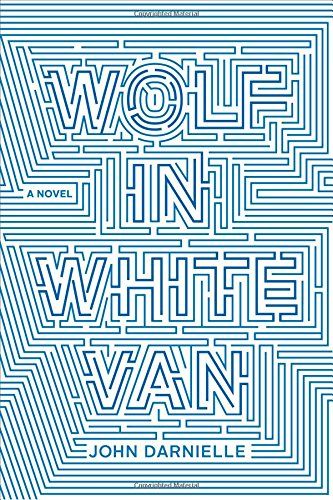 Wolf in White Van, by John Darnielle
Wolf in White Van, by John Darnielle
Farrar, Strauss and Giroux
October 2014
Primarily, John Darnielle is known as a member of the band, The Mountain Goats. For his first novel, Darnielle imagines how a text-based role-playing game collides with real world events. Part suspense, and part psychological drama, we look forward to entering into this world where the terror of the situation also reveals the identity of the protagonist.
***
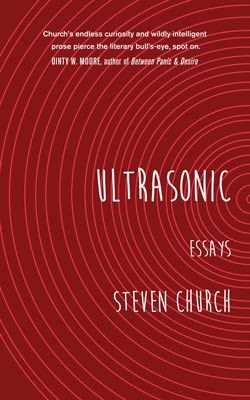 Ultrasonic, by Steven Church
Ultrasonic, by Steven Church
Lavender Ink
December 2014
Former RWU professor Steven Church’s fourth book is a collection of themed essays that explore how sounds (and the concept of sound) can reveal truths and understandings about the world we live in, and how we live in it. Typical Church essays explore notions of identity through considering the continuum of his own experiences (as a brother, a father, a friend, and a partner) within the context of larger cultural expectations. Always smart, insightful, and meticulously researched, Church’s lyrical essays tend to flow between humorous, generous, and painfully honest. Steven Church never skimps in his work, and for that reason we anticipate being fully engaged in Ultrasonic.
FEATURED REVIEW
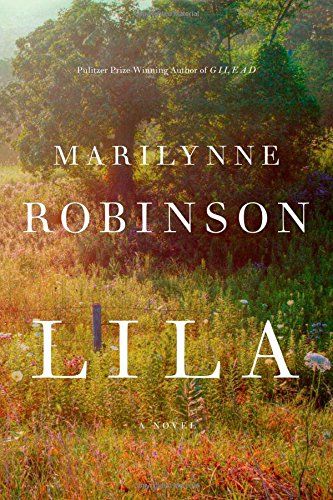 Lila, by Marilynne Robinson
Lila, by Marilynne Robinson
Farrar, Straus and Giroux
October 2014
The eponymous hero of this short and lucid novel by Robinson fleshes out a character mostly offstage in Robinson's 2004 Pulitzer-Prize-winning novel Gilead: the much-younger wife of Gilead's 76-year-old protagonist, the minister John Ames. Gilead is epistolary, taking the form of a long letter from the dying Ames to his seven-year-old son; much involves Ames's father and grandfather, both ministers themselves. That novel is long on philosophy and shorter on action, excepting the actions of the long-ago past.
Lila receives little direct attention in Gilead; a decade later Robinson tells her story in fine prose and with a turn. Lila's story is far less philosophical; it's the story of a woman who has fought for survival nearly since birth and now finds herself, through events and wanderings, to be the young wife of an old, and unfailingly kind, man.
In Lila, it is the Reverend seen through her eyes, as she was through his in the earlier book. Lila as a child drifts with itinerant pickers across the Midwest, watched over by an old woman named Doll, who might have been her savior, but might also have been her kidnaper. Lila is the story of a young woman left few choices in life, who must still yet make them. The story unfolds in parts, interspersed with the story of her awkward courtship by the minister.
Lila is an excellent novel that is less prequel or addition than something of a mirror part. There is a third book of what might now be called the Gilead Trilogy, but Home (2008) is more of a spinoff, in my mind.
In reading Lila and how it fills out Gilead, I'm reminded of Evan Connell's twin novels Mr. Bridge and Mrs. Bridge, also published a decade apart. And like those two books, Gilead and Lila work as one story in complementary testimony. Indeed, I consequently returned to a re-reading of Gilead with a new dimension and satisfying circularity.
--Edward J. Delaney
________________________________________________________________________________________________________________________________________
Inappropriate Behavior by Murray Farish
Milkweed Editions
March 2014
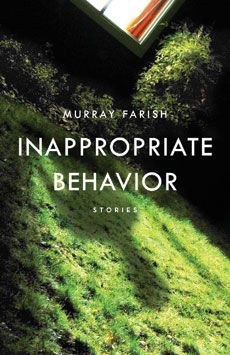
While beginning Murray Farish’s first collection of short stories, Inappropriate Behavior, I did not know what to expect. Nine stories later, I was frantically searching the internet for something else—anything else—I could read by this emerging author. A mysteriously omitted tenth story, perhaps?
I ended up settling for a couple of interviews with Farish regarding his first major published work. In the interviews, Farish, who teaches at Webster University, proved to be just as enriching as the stories themselves. Perhaps most insightful was his belief that people seem to spend too much time wishing for a different reality other than their own—a theme seen in nearly all his stories. Many of the characters in Inappropriate Behavior struggle with this very issue. Their various responses are always captivating and, often times, relatable. To put it simply, if you are looking to better understand the struggles of those around you, learn a thing or two about present day America, and be entertained in the process, then you should read this collection.
After the first story, “The Passage,” it will be clear that you are in for nearly two hundred pages of memorable characters, unexpected action, and moral strengthening. Every character you meet will force you to decide whether you love or hate them. Most are so complex that they offer a sobering lesson in how easily the two emotions can rightfully coexist, while always searching and negotiating for a livable middle.
Once you travel across the open sea with the eighteen-year-old protagonist in “The Passage,” sharing a bunk with the infamous Lee Harvey Oswald, you will watch as businessmen crabwalk across the parking lot to their cars, couples become torn apart by the naked body of a teenager, and a downright cynic is punished for momentarily putting aside his cynicism.
The title story, “Inappropriate Behavior,” is saved for the finale. Murray Farish must have known that it was the most impactful story. Through the nearly forty-page journey we see, through a new lens, the crippling reality of today’s post-recession America intertwined with the formidable task of raising a child with severe mental illnesses. Regardless of who you find yourself rooting for and who you find it impossible not to root against, you won’t forget anyone you met or the struggles they endured for quite some time.
--Kevin Marchand
Order your copy of Inappropriate Behavior here.
________________________________________________________________________________________________________________________________________
Some Desperate Glory: The First World War The Poets Knew by Max Egremont
Farrar, Straus and Giroux
June 2014
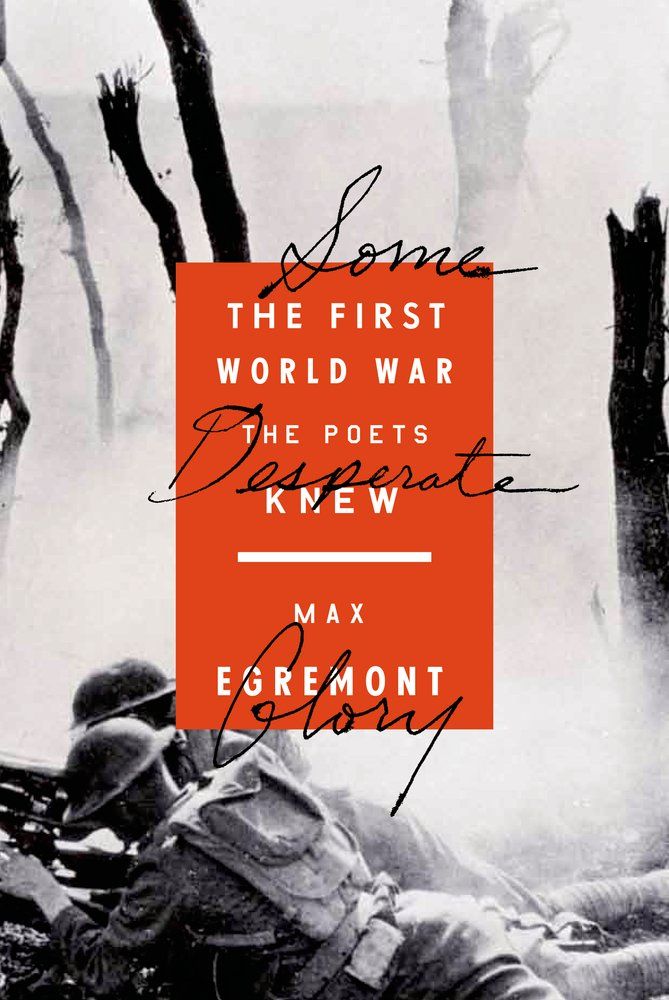
In tracing the poets' war careers, it strikingly takes a series of large defeats, and the resulting hundreds of thousands killed and wounded (including some of the poets), for the mood to shift. Bitterness shines through by 1916, yet it is a bitterness about what could and should have been. This yearning for an ideal past links the second half of the war to the first, and, more importantly, maintains the the thread into the post-war years. Siegfried Sassoon's 'Blighters' (1917), Isaac Rosenberg's 'Dead Man's Dump' (1917), Wilfred Owen's 'Dulce et Decorum Est' (1918): all of them drafting the war's true imagery; all of them asking the difficult questions.
For those who survived the conflict, the search for an ideal past continued. An uncomplicated Edwardian England was replaced with a complex and tragic war experience. The poets' true understanding of the war depended upon the public truly appreciating its soldiers' sacrifices. Only with this goal reached could the poets at last find peace. The reality was that the country moved on without them. Only Robert Graves claimed to have found clarity after 1918, dismissing his war poetry as mere journalism. For the others, facing the future required living in the past.
Egremont's Some Desperate Glory takes its title from Owen's 'Dulce et Decorum Est'. Edwin Campion Vaughan's 1917 war diary (published posthumously in 1981) shares the title again. All three works therefore rest in the vein of Great War literature that casts the conflict as a forlorn hope. Egremont tackles this historical standard with a discussion of those critics who did not believe the war was as Thomas, Brooke, Rosenberg, or even Graves had described it. The conflict was terrible, yes, but to read the poets was to believe that Britian had lost. Yet, perhaps the British victory made it all the more difficult to square soldiers' sufferings.
Nevertheless, Egremont's book is one of a number published in the run up to the war's centenary. All the tropes of war understanding are appearing again, with countless images of smiling soldiers off to the front and the carnage that resulted. Some Desperate Glory is there to remind us of the cost of war, but it is only good for what it is: an analysis of an event that occurred one hundred years ago. Historical analysis is also, sadly, historical interpretation. At the time the critics wondered if Sassoon was not just a glory seeker-someone who enjoyed the sound of his own voice. The poets often critiqued each other, readily pointing out the deficiencies in their colleagues, thereby fighting to claim the honor of the war's most genuine voice. Appreciating the Great War requires us to appreciate that it was not as cleanly horrible as historical memory suggests. Importantly however, it makes the conflict all the more human.
--Dr. Jeffrey Meriwether
Order your copy of Some Desperate Glory: The First World War The Poets Knew here.
________________________________________________________________________________________________________________________________________
Chase Us: Stories by Sean Ennis
New Harvest
May 2014
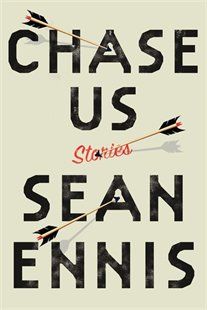
Chase Us, Sean Ennis’ debut book, is a collection of eleven stories about his experiences growing up in the confusing, turbulent streets of Philadelphia, at times blurring the line between fiction and memoir. Beginning when he is just 11 and progressing chronologically into adulthood, Ennis’ stories depict his childhood learning experiential lessons while roaming the streets of Philadelphia with his cohort of friends.
Taken in whole, these stories highlight the difficulties of reaching maturity in the ever-changing and fast-paced modern world. In “Saint Kevin of Fox Chase,” a teenaged Ennis barely avoids a savage beating from a rival neighborhood, but his friend Kevin isn’t as lucky; halfway through the collection, Ennis and his college roommates suffer repeated break-ins until they are forced to leave town in “This is Ambler;” and in the final story, “This is Tomorrow,” Ennis, his wife, and his child must hunker down to survive a violent tornado.
Despite the hardships, Ennis infuses his stories with satire and wit. From the discovery of “Indians” in a cage in the city park to the purchase (and ensuing mishap) of an old school bus to the plea for help from a very stoned, “kidnapped” veteran at a house party, Chase Us will leave the reader laughing out loud and asking for more.
Sean Ennis highlights not just the chaotic nature of childhood, but also the chaotic nature of the world into adulthood. Written in bouncing prose that draws the reader in, Ennis crafts a beautifully written collection that depicts childhood as simultaneously brutal and comical. With raw emotions and honest feelings, Chase Us is a poignant testament to the challenges of growing older.
--Ryan Monahan
Order your copy of Chase Us here.
________________________________________________________________________________________________________________________________________
What Has Become of You by Jan Elizabeth Watson.
Dutton
May 2014
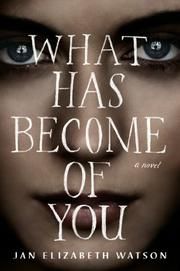 What Has Become of You captivates the reader from the first page. With cliffhangers and mysterious plot developments, Jan Elizabeth Watson’s second novel leaves the reader questioning the complex actions of the characters even past the last page.
What Has Become of You captivates the reader from the first page. With cliffhangers and mysterious plot developments, Jan Elizabeth Watson’s second novel leaves the reader questioning the complex actions of the characters even past the last page.
Vera Lundy, 40 years old, pale, meek, and timid, finds herself as a substitute teacher of an all-girls school in rural Maine. The town, Dorset, has just been rocked by a tragedy – the murder of a high school girl. Although the guilty party has come forward, doubt surrounds his arrest, and tensions are high in the classroom Vera has been assigned. The theme of death repeatedly surfaces in the class discussions as Vera and her new students work their way through The Catcher in the Rye. One student in particular, the fifteen year-old Jensen Willard, connects with J.D. Salinger’s novel and with Vera on a personal level through her animated yet troubling journal entries. However, when another death rocks the town, Vera’s passion for mystery novels and her own sense of responsibility starts to take over. As the novel develops, the pace quickens and Vera finds herself sucked into the murder investigation. Following ambiguous clues and nondescript handwritten notes, Vera’s quest begins to subtly mirror that of Holden Caulfield’s journey from The Catcher in the Rye.
As What Has Become of You unfolds, and Vera begins to peel back the various layers around her, she struggles to realize the ultimate truth, painting a realistic picture of natural human skepticism. Readers who enjoy a suspenseful, many-layered story need look no further: pick up What Has Become of You.
--Ryan Monahan
Order your copy of What Has Become of You here.
________________________________________________________________________________________________________________________________________
The Snow Queen by Michael Cunningham.
Farrar, Straus and Giroux
May 2014
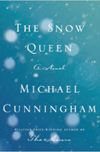 Michael Cunningham’s newest novel The Snow Queen chronicles two middle-aged brothers who search for meaning in a seemingly unfruitful and disappointing life. Years go by as the novel progresses, and the story follows the two inseparable brothers as they change and develop. Cunningham, author of six novels (including the Pulitzer Prize-winning The Hours) has succeeded yet again in creating a captivating narrative that immerses the reader in the complex and changing lives of the two men.
Michael Cunningham’s newest novel The Snow Queen chronicles two middle-aged brothers who search for meaning in a seemingly unfruitful and disappointing life. Years go by as the novel progresses, and the story follows the two inseparable brothers as they change and develop. Cunningham, author of six novels (including the Pulitzer Prize-winning The Hours) has succeeded yet again in creating a captivating narrative that immerses the reader in the complex and changing lives of the two men.
Set in 2004, The Snow Queen’s opening scene features Barrett Meeks wandering alone through Central Park after yet another lost opportunity for love. Alone and depressed, Barrett witnesses what he can only describe as a miracle. Just a few feet above his head hovers a green orb of light that seems to address him as a god would address a mortal. Barrett, a lapsed Catholic, promptly returns to his religious roots and vows to find new a place in his life for God. Through religion and constant self-reflection, Barrett learns to cope with his seemingly diminishing opportunities for companionship, as well as gradually learning to accept what he considers an inconsequential life.
Meanwhile, in a dilapidated neighborhood in downtown New York at the Meeks’ home, Barrett’s older brother Tyler agonizes over the composition of the perfect wedding song for his gravely ill bride-to-be, Beth. Tyler seeks to compose a ballad that will not only express his eternal love, but will also serve as an acceptance of unescapable mortality. At 43, Tyler is becoming increasing pessimistic about his musical career, but increasingly convinced that he must achieve at least mild success as a songwriter. His reliance on drugs to achieve success alarms his friends and loved ones, but it seems impossible for him to escape the downward spiral.
The Snow Queen traces the Meeks’ brother’s progress over the years as they follow drastically different paths in the search for a deeper meaning of life. The conflicted, flawed characters that Cunningham creates struggle with their fleeting youth and the unique challenges of the 21st century, allowing a variety of readers to connect with the novel.
At once moving and inspiring, The Snow Queen stands apart as a tribute to the limitations of the human condition. In an eloquent and vivid narrative, Michael Cunningham prompts his readers to reflect on themselves and consider the significance of their life in regards to the greater human experience.
--Ryan Monahan
Order your copy of The Snow Queen here.
________________________________________________________________________________________________________________________________________
All At Once by C. K. Williams.
Farrar, Straus and Giroux
April 2014
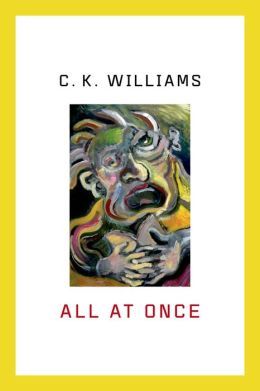
Deliberately blurring the lines between microfiction and poetry, Pulitzer Prize winning poet C.K. Williams’ latest book All At Once does not simply hop back and forth across the definition but plays with what we define as narrative and abstraction, hallmarks of the mentioned forms. The title of the work itself even plays into the concept: everything is happening together, narrative being blown out by the language play of poetry and poetic structures being overtaken by narratives – often occurring in the same work. Williams’ narratives play on gaps of time and space, allowing the minimal use of narrative in these places to allow the more linguistic elements to perform, providing them an artifice in which to exist. By combining these elements into the same short pieces and combining all of these pieces into one book, Williams eschews the conventions of uniformity in a book by creating new unifications throughout the text. Like a good novel, elements forgotten reappear in a manner that expects the readers, despite their brief mention, to recall, however confusing the recollection may be. Like a good set of poems, Williams’ work builds until its penultimate section, “A Bedroom in Africa,” a longer piece but one made up of the elements that are found throughout the book. Whereas the piece after uses the flow of conversation as its form, “A Bedroom in Africa” expects the reader to be aware of the work that has come before it in the collection. This is not to say that “Sixty” does not require the same knowledge, but it requires it in a different manner, expecting the reader to have the experience of having read such widely ranging narratives and experiments in language.
-Amish Trevdi
Order your copy of All At Once here.
________________________________________________________________________________________________________________________________________
Farrar, Straus and Giroux
April 2014
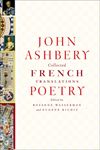
Like its companion volume, dedicated to prose translations, this work amazes by its size and range. One hundred and seventy-one poems by twenty-five poets find themselves in elegant new English clothes. One virtue is that this range gives us a fairly thorough survey of the twentieth century, from the famously difficult Mallarmé and under-rated Jules Supervielle to contemporaries like Pascalle Monnier.
We’re familiar with Ashbery’s own poetry, of course, and his work is a singular moment in the history of American letters. He is prolific, but more importantly he doesn’t sound like anyone else. No one matches his gift for startling metaphor, for dislocating everyday life and prying loose something revelatory. To find his ilk we have to look, in fact, to early twentieth century French poets: Pierre Reverdy, René Char, Max Jacob. That’s why this new volume is so fitting; many of these translations seem to have come home, in a strange way, to Ashbery’s well-known idiom.
Sure enough, those three poets are translated here, along with that undisputed influence on Ashbery, Arthur Rimbaud (Ashbery’s translation of Rimbaud appeared as a book in 2011). But important poets—not well enough known in America—such as Paul Eluard and René Daumal also appear here. The editors, as with the prose translations of Ashbery (same publisher), have written a very extensive introduction which gives context not only to Ashbery’s knowledge of the French world but also to his entire poetic life.
Order your copy of COLLECTED FRENCH POETRY, TRANSLATIONS here.
________________________________________________________________________________________________________________________________________
COLLECTED FRENCH PROSE, TRANSLATIONS. John Ashbery; edited by Roasanne Wasserman and Eugene Richie.
Farrar, Straus and Giroux
April 2014
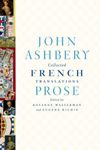
This remarkable volume is perhaps the place (even more than in the poetry translations) to discover Ashbery’s interest in French culture, along with his eclectic taste. After all, we know his poetry, and that he has translated French poetry (his brilliant versions of Rimbaud’s Illuminations appeared in 2011). A romp through the table of contents, guided by the gifted editors, shows Ashbery to be fascinated (he seems to shy away from “influenced”) by the French, and by the writings of playwrights, artists, musicians and critics—not just poets and fiction writers. Several unpublished or long-out-of-print writers are included.
Delightful to have Dalí’s essays, and to have one by surrealist Michel Leiris on Raymond Roussel. Roussel is one of the key figures in Ashbery’s introduction to French literature. The editors probe the possibility of Roussel’s influence; this writer of experimental fiction is one of the few in whom Ashbery admits some “resemblances” to his own work. The introduction to this volume carefully outlines Ashbery’s years in France, his friendships with writers such as the poet Pierre Martory, and the great variety of his cultural connections. The book is filled out by a bibliography and, even more usefully, a complete list of the first publication dates of the translated works.
As for the translations themselves, they are masterful: smooth, full of life and idiomatic.
Order your copy of COLLECTED FRENCH PROSE, TRANSLATIONS here.
________________________________________________________________________________________________________________________________________
Strange Bodies by Marcel Theroux
Farrar, Straus and Giroux
February 2014
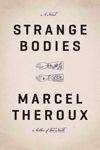
Marcel Theroux’s newest book Strange Bodies is a gripping novel that combines literature, science fiction, mystery, and philosophy. Theroux, a London novelist and author of four books (including 2010’s National Book Award finalist, Far North), writes a suspenseful tale that by the end will leave you questioning your own personal identity.
Strange Bodies tells the story of Nicholas Slopen, a recently divorced and impoverished scholar studying Dr. Samuel Johnson, the author of A Dictionary of English Language, published in 1755. Confined to a mental institution in 2009, Nicholas, narrating via journal to a friend, recalls his own death several months earlier, explaining that his consciousness survived his bodily death. From there begins his recounting of the events that led to his strange circumstances.
We learn that in April of that same year, Nicolas had been hired by an unassuming literary fanatic to examine several unpublished letters by Dr. Johnson. There were questions of authenticity, and accusations of forgery by a man seemingly displaced in the wrong century. From there, Nicholas begins to spiral into a world of conspiracy and literary mystery that, at surface level, appears to transcend time.
Readers who have a familiarity and passion for classical literature, especially that of Samuel Johnson and his contemporaries, will find Strange Bodies particularly thrilling. However, Theroux creates such a dynamic protagonist that any reader will find him or herself swept into the mysteries of Nicholas Slopen’s world, one that becomes instantly relatable. As you read Strange Bodies, you’ll find yourself pondering such questions as: What exactly constitutes a person’s consciousness? Does the death of a person’s body cause his or her identity to die? Theroux’s novel will suck you into the same world of conspiracy that Nicholas enters, and you’ll be unable to escape until the last page.
Order your copy of Strange Bodies here.
________________________________________________________________________________________________________________________________________
Lost for Words by Edward St. Aubyn
Farrar, Straus and Giroux
May 2014
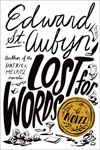
It seems that at any social gathering of writers there is at least one person who will bring up the Patrick Melrose novels by Edward St. Aubyn. With passion and enthusiasm, our writer will explain that she is referring to a series of three short novels that track the life of a fictional contemporary English aristocrat named Patrick Melrose, paralleling the inner trajectories of Melrose’s life with that of the vestiges of an old world aristocracy in a modern world. But those themes and storylines are not the selling point for our passionate novelist. It is St. Aubyn’s writing. The way he crafts a sentence with an elegance and naturalness that divines yet rarely calls attention to itself. The biting humor that infects the sometimes wrenching parts of the narrative with the precise timing of a well-heeled comic. And not to be forgotten is Edward St. Aubyn’s precise negotiation of the spaces between empathy, satire, pathos, and farce.
Needless to say, when we saw Edward St. Aubyn’s upcoming novel, Lost for Words, on the upcoming release list, with subtlety and sleight-of-hand we moved it to the top of the reading pile. The novel is a send-up of the Man Booker Prize, the prestigious prize awarded to a novel from the Commonwealth of Nations, the Republic of Ireland, or Zimbabwe. (Note: beginning in 2014, the prize will expand its horizon to any novel from around the world, with the provision that it was written in English and published in the UK.) Throughout its almost half-century, the Booker has been a repository of controversy at both its longlist and shortlist phases, from public dissension among the judges to outcries from the finalists, burnished by complaints of conspiracies from book critics and close watchers. Through an ensemble cast, St. Aubyn (himself shortlisted for the 2006 Man Booker) weaves an amalgam of the storied controversies into a send-up that takes the reader into an over-the-top world that somehow still manages to stay scarily real.
In Lost for Words we have the Man Booker recast as the Elysian Prize, and, through alternating perspectives, we watch a repertory of interested players, from the individual judges to the writers to the publishers. It is a story of jockeying. Of greed. Of manipulation. And of course the seduction of power. It also is a novel that shows the objective for celebrating the art has little to do with the art, itself; instead, the goal is to see what can be appropriated from it. But as dire as that sounds, Lost for Words is a fun novel. All the players are exaggerated and just larger-than-life enough to be real characters without becoming caricatures. And St. Aubyn’s comedic timing is present throughout the whole novel. Some of the fictional excerpts from the novels being considered for the Elysian are alone worth the read.
Lost for Words may rely on some insider humor—it’s hard to say, as it sends up a world that we’re familiar with—but we relished every moment of it. We were glad we moved it right to the top of the nightstand pile.
Learn more about Edward St. Aubyn here.
________________________________________________________________________________________________________________________________________
Can't and Won't: Stories by Lydia Davis
Farrar, Straus and Giroux
April 2014

In her latest book, her fifth collection, Lydia Davis (winner of the 2013 Man Booker International Prize, a 2003 MacArthur fellow) forces us to examine our own definitions of fiction and narrative. Made up primarily of “stories” (however you define such a thing) which are a few paragraphs (mixed with some longer pieces), these mini-narratives often read more like prose poems than they do fiction, which urges us to ask whether we truly know where fiction ends and poetry begins. One begins to notice throughout that Davis often mixes humor with more mature statements on life, which is offset again the mixed of forms throughout the book. Occasionally there are letters or lists that read like a George Carlin joke. Often, pages are marked as “dreams” to tell us that these are not the rational thoughts of a mind but rather the liminal or subconscious mind poking through the surface. Don’t let the short pieces fool you: just because something takes less time does not mean it is easier to read the whole book. The short pieces are thought provoking, often leaving one asking larger questions of themselves. A rare book that is totally all right to put down and pick up at random intervals.
Order Can’t and Won’t here.
________________________________________________________________________________________________________________________________________
The Poetry of Derek Walcott 1948-2013, By Derek Walcott, (ed. Glyn Maxwell)
Farrar, Straus and Giroux
January 2014

The Poetry of Derek Walcott 1948-2013 is slated for release later this January, and we are impossibly excited for its publication. This selection of Walcott’s poetry is both extensive and varied, spanning the entirety of his celebrated poetic career. A Nobel Prize winner and the recipient of a MacArthur Foundation Genius Grant and the Queen’s Gold Medal for Poetry, Walcott’s work is unquestionably one of the most important of our time. Edited by Glyn Maxwell, the volume includes some of Walcott’s most essential poems of the last sixty-five years, including “A Far Cry from Africa” and “Sixty Years After.” The collection’s chronological format allows the astute reader to trace Walcott’s personal and creative evolution from a tightly wound aesthetic style to his current looser and more settled forms. We’re eager to dive into poems that deal with the complicated themes that define Walcott’s work as they have defined his life: the meaning of identity; the ordeal of aging and loss; the painful consequences of colonialism on his island home of St. Lucia; the nature of love and faith; and, perhaps most significantly, the importance of honoring one’s own memory. Derek Walcott is one of the distinguished poets of our time, and with Maxwell’s careful selections it easy to see why Walcott’s work has resonated with readers for over half a century.
Order The Poetry of Derek Walcott, 1948-2013, here.
________________________________________________________________________________________________________________________________________
A Prayer Journal, by Flannery O'Connor (ed. W.A. Sessions)
Farrar, Straus and Giroux
November 2014
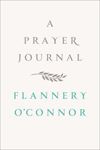
Flannery O’Connor’s prolific, though short, life gave the world two novels and thirty-one short stories, as well as numerous craft essays. We have always loved her dry, unassuming wit, and her authentic southern characters. When we discovered that her personal journal from her time at the University of Iowa had been found among her papers in Georgia, we were excited to get our hands on it. Though we’ve always known O’Connor was a devout Catholic, her habit of poking fun at religious hypocrisy can cause us to forget that religion played a large role in her life. A Prayer Journal departs from what we’ve become accustomed to as O’Connor’s straightforward prose. Each entry is her own form of prayer, and we can see how much she looked to a higher power for inspiration. We were eager to read the introduction by W. A. Sessions, who knew O’Connor and elaborated on her frame of mind in 1946 and 1947, when she wrote in the journal. The most captivating part, however, might just be the facsimile of the journal itself that makes up the second half of the book. Being able to see O’Connor’s handwriting only adds to this rare glimpse into an amazing writer’s early insecurities, which is just one of the many reasons we’re so excited to read A Prayer Journal.
Order A Prayer Journal, here.
________________________________________________________________________________________________________________________________________
Book of Hours, by Kevin Young
Knopf
March 2014
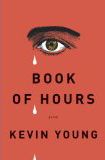
Award-winning poet Kevin Young's eighth book, Book of Hours, is coming out in March of 2014, and we cannot wait for its release. The collection is an emotionally impactful examination of life's vicissitudes, from the grief at the loss of Young's father to the anticipation of his son's birth. Travelling a spectrum of emotional material, Young maintains a difficult balance between deep emotion and lighthearted wit. For example, his descriptions of the bureaucracy and business of death are shockingly stark, all shown in order to capture the harsh procedural aspects of loss. Though Young’s poems pinpoint many of the hard moments, they are never unfeeling or uncomfortable—they’re just filled with a beautifully painful accuracy. He captures a wide and sensitive range of human emotions with a fresh and unique perspective while retaining a relatable universality. Book of Hours is nearly impossible to put down.
Order your copy of Book of Hours, here.
Also, be sure to visit Kevin Young's website!
________________________________________________________________________________________________________________________________________
Bark, by Lorrie Moore
Knopf
March 2014
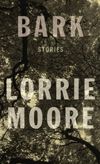
It would almost be odd not to say we were looking forward to Lorrie Moore’s upcoming book, a collection of stories called Bark. It would be odd for us not to immediately want to delve right into all eight short stories at once. We would be committing literary treason to not immediately note how seduced we were by opening lines from various pieces, such as, “Ira had been divorced for six months and still couldn’t get his wedding ring off (Debarking),” or “Although Kit and Raf had met in the peace movement, marching, organizing, and making no nukes signs, now they wanted to kill each other (Paper Losses),” or “The day following Michael Jackson’s death, I was constructing my own memorial (Thank You For Having Me).” We would be traitors to the cause of literature if we didn’t find ourselves laughing at Moore’s deadpan observations, such as when a billboard in the story Wings read HOSPICE CARE: IT’S NEVER TOO SOON TO CALL, and next to it “a traffic sign read PASS WITH CARE.” As Moore notes in the next sentence, “Surrealism could not be made up.” Yet as any reader of Lorrie Moore knows, her acute observations are ones that show the intimacy of the lives she is writing. Real people in real circumstances, trying their best to negotiate the personal with the political, wanting to make decisions in a world that too often is making decisions for them, and balancing their moral center against the temptations of all varieties of justification. And quite soon we realize that some of the stylistic hallmarks we might attribute to Moore are not really brushstrokes or casting or gilding; in fact more often than not they are the beautifully fractious ways lives are led. And that is but one short reason why we are looking forward to Bark. It just would be too odd not to.
Order your copy of Bark, here.
________________________________________________________________________________________________________________________________________
The Facades, by Eric Lundgren
The Overlook Press
September 2013

Eric Lundgren’s debut novel will introduce readers to the dystopian ghost town of Trude. The book, which has already earned Lundgren comparisons to Franz Kafka, David Lynch, and Haruki Murakami, tells the tale of one man’s quest for his missing wife within the once thriving Midwestern city. We are very excited to explore the post-modernist back alleys and crumbling buildings of Trude through the eyes of Lundgren’s hapless legal clerk, Sven Norberg, and to encounter with him the shifty and subversive characters that pepper the book’s pages. The Facades is an official selection of the 2013 Book Expo America Adult Editor’s Buzz Panel and the September 2013 Midwest Independent Booksellers Association Midwest Connection, and is the Fall 2013 Barnes and Noble Discover Great New Writers Pick. And we add the book to one of our top picks of books we’re looking forward to reading.
Order The Facades from The Overlook Press.
________________________________________________________________________________________________________________________________________
A Permanent Member of the Family, by Russell Banks
Ecco Press
November 2013
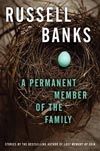
Perhaps best known as one of our great living novelists, Russell Banks returns to the short story form in his soon-to-be-published collection, A Permanent Member of the Family. For nearly four decades, Banks has shown himself to be a writer who is an astute observer of the conflicts between the hopes and fears of well-meaning people, who, quite often, are ordinary people forced into difficult decisions placed upon them by extraordinary forces. We are anxious to read the twelve stories in this collection, fully anticipating that Russell Banks will introduce us to a whole new family of characters—all who are compelled to do the right things in their lives, but often forced to weigh the moral compromises that they will have to make to survive in a fragile and often difficult world. There are very few contemporary fiction writers who show us the America that we all live in as well as Banks. He is a master storyteller. As such, we can’t wait to read these twelve stories, all in one place, bound between two covers. In terms of upcoming fall releases, A Permanent Member of the Family tops our list.
Order A Permanent Member of the Family from Ecco Press.
________________________________________________________________________________________________________________________________________
The Great Floodgates of the Wonderworld, by Justin Hocking
Graywolf Press
March 2014

First, in the literary journal The Normal School we read Justin Hocking’s essay, “All I Need Is This Thermos.” Second, we find out it’s from a forthcoming book. Third, we go on the lookout for the book we learn will be called The Great Floodgates of the Wonderworld—A Memoir. Although we’ll have to wait until March 2014 for it to be published, now that we have had our hands on an advanced copy, we are finding that our excitement only is building. Hocking’s memoir centers on his relocation to New York City, and both the thrill and loneliness of being there. His initial salvation comes from joining the surfing community at Rockaway. But The Great Floodgates of the Wonderworld is more than that. It is a book of obsessions. A book of New York. A book about community. A memoir of what it means to go inside one’s self and face the consequences of doing what it takes in order to survive in, and engage with, the outer world. Hocking’s memoir is structured as a series of short, connected essays. From what we’ve seen thus far, individually and as a whole, The Great Floodgates of the Wonderworld is written with an immediacy that grabs us and pulls us in to Hocking’s world. Oh, and fourth, we couldn’t wait to tell you about it.
Keep checking Graywolf Press to order your copy.
________________________________________________________________________________________________________________________________________
Connect with the RWU Library on Facebook and Twitter!


